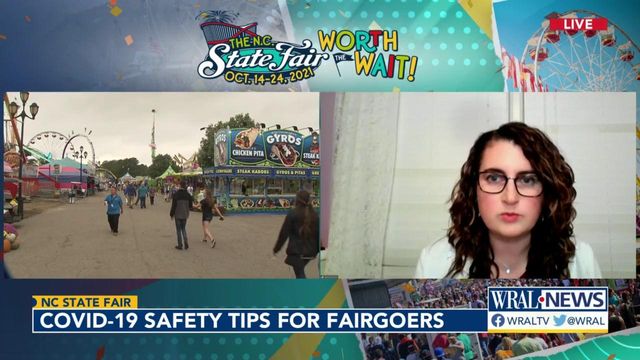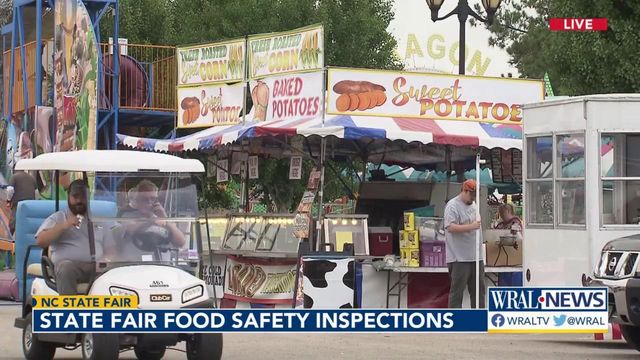The unvaccinated and elderly are at great risk for contracting COVID at N.C. State Fair, health expert says
Food vendors will be encouraged, but not required, to follow coronavirus protocols at the North Carolina State Fair this year.
Posted — UpdatedJessica Dixon, an infection prevention specialist at WakeMed, said that high-risk groups should rethink going to the N.C. State Fair.
"Certainly unvaccinated people are at greatest risk, but even vaccinated people who may be immunocompromised, people who are at higher risk for COVID-19, may want to consider whether or not this is the right time to visit," she said.
Masks and vaccinations are encouraged to attend the state fair, but are not required. In addition, Food vendors won't be required to follow coronavirus protocols at the North Carolina State Fair this year.
Wake County is handing out fliers to the 147 food vendors to encourage them to wear cloth face coverings, disinfect surfaces frequently and check temperatures for employees.
Dixon encourages people who plan to get food from vendors to eat outdoors, and wash their hands before eating.
"Food has not been shown to be a significant source of COVID-19 transmission, so your greatest risk when eating is going to be the fact that you're putting your hands near your face, especially when you're eating fair food," Dixon said. "It's all finger food, hand-held food."
By the time the fair starts Thursday, each booth will have a yellow inspection certificate showing they have passed the county's checklist.
"We're encouraging frequent hand-washing, and I'd like to point out that's part of keeping food safe anyway," said Ginger Johnson, spokeswoman with Wake County Event Permitting. "This is something that's been continuous: social distancing as much as possible, wearing masks."
But at the end of the day, the government is not enforcing any regulations on the vendors. It's up to each individual to decide how they will navigate safety at the fair — even though the county and city of Raleigh has a mask mandate in place. The mandate applies to places such as grocery stores, restaurants and retail shops.
Vendors at the fair told WRAL News they would try their best to follow protocols, even when it gets busy.
Wiley Greene, a vendor from Indiana, is wearing a face mask and checking his staff member's temperatures each day. Greene said that he will do whatever he needs to do to make customers feel safe.
The N.C State Fair also has special rides and areas designated for children, and children 12 and under are not yet eligible for the coronavirus vaccine. Dixon suggests that unvaccinated children are also at high risk of catching the virus, so this year might not be the best to attend.
"I think kids, they probably handled this maybe better than we do as adults, because they are much more used to pivoting than we are," she said.
The State Fair was canceled last year due to the coronavirus pandemic, at a loss to the state of millions of dollars. The fair attracted more than 938,000 people over its 11-day run in 2019.
North Carolina reported another 2,148 coronavirus infections on Tuesday, pushing the average to 3,299 a day over the past week. The good news is that the average number of coronavirus cases has now declined for 25 consecutive days.
More Americans are deciding to get vaccinated against coronavirus, according to the U.S. Centers for Disease Control and Prevention. Around 1 million more people are getting vaccinated each day, health officials say.
While Wake County has a relatively high vaccination rate — 65% of the population is fully vaccinated — some surrounding counties have vaccination rates as low as 30%, and the fair is known to attract people from all across the state.
"Regardless of your vaccination status, I think you have to do a risk assessment," Dixon said. "Both for your own help and the help of the people around you as you decide whether or not to go to the fair."
Health experts speculate that the delta variant of coronavirus has not finished running its course. Cooler weather may drive up infection rates as more people spend time indoors.
Data from other states suggests that the fair, even though it is mostly outdoors, could be a driver in coronavirus cases. In Minnesota, nearly 300 coronavirus cases were linked back to the Minnesota State Fair. More than 100 coronavirus cases were linked to the Washington State Fair last month.
"You're starting to see an uptick in cases in the colder parts of the country and as people are driven indoors without masks on," former Food and Drug Administration Commissioner Dr. Scott Gottlieb said Monday.
New coronavirus cases jumped by more than 10% in the past couple weeks in five states — Montana, Colorado, Minnesota, Michigan and Vermont.
"The delta wave has not run through the United States," Gottlieb said, according to CNN. "I think we have a couple of months to go."
State Fair officials say that attendees can either bring a clear bag to the fair or put the contents of their bag into a clear bag while going through security, then put those items back in their personal bag afterward.
Related Topics
• Credits
Copyright 2024 by Capitol Broadcasting Company. All rights reserved. This material may not be published, broadcast, rewritten or redistributed.






